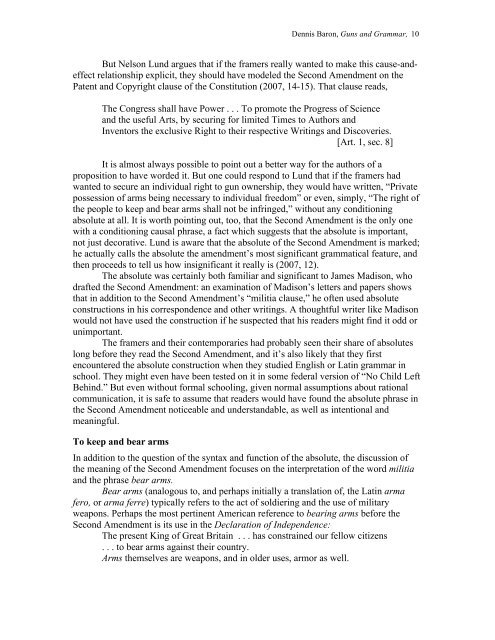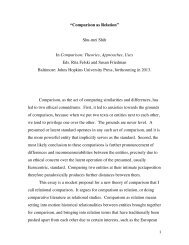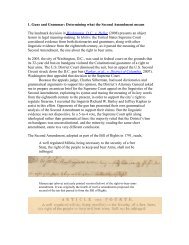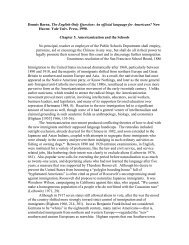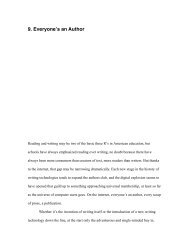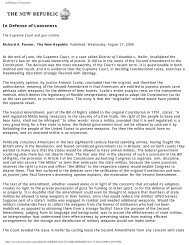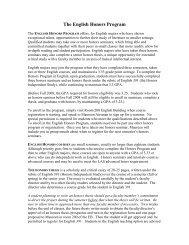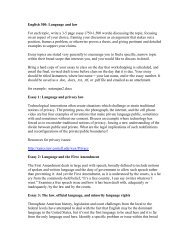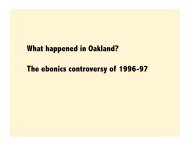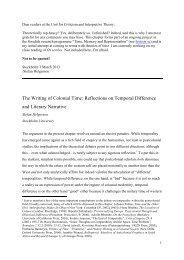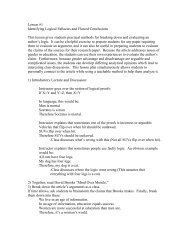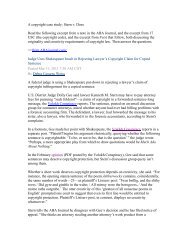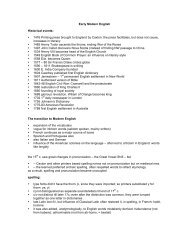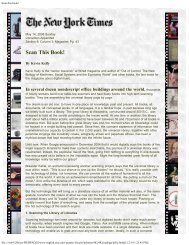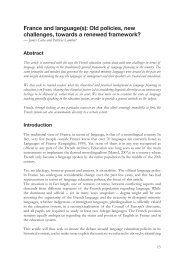Guns and Grammar: the Linguistics of the Second ... - English
Guns and Grammar: the Linguistics of the Second ... - English
Guns and Grammar: the Linguistics of the Second ... - English
Create successful ePaper yourself
Turn your PDF publications into a flip-book with our unique Google optimized e-Paper software.
Dennis Baron, <strong>Guns</strong> <strong>and</strong> <strong>Grammar</strong>, 10<br />
But Nelson Lund argues that if <strong>the</strong> framers really wanted to make this cause-<strong>and</strong>effect<br />
relationship explicit, <strong>the</strong>y should have modeled <strong>the</strong> <strong>Second</strong> Amendment on <strong>the</strong><br />
Patent <strong>and</strong> Copyright clause <strong>of</strong> <strong>the</strong> Constitution (2007, 14-15). That clause reads,<br />
The Congress shall have Power . . . To promote <strong>the</strong> Progress <strong>of</strong> Science<br />
<strong>and</strong> <strong>the</strong> useful Arts, by securing for limited Times to Authors <strong>and</strong><br />
Inventors <strong>the</strong> exclusive Right to <strong>the</strong>ir respective Writings <strong>and</strong> Discoveries.<br />
[Art. 1, sec. 8]<br />
It is almost always possible to point out a better way for <strong>the</strong> authors <strong>of</strong> a<br />
proposition to have worded it. But one could respond to Lund that if <strong>the</strong> framers had<br />
wanted to secure an individual right to gun ownership, <strong>the</strong>y would have written, “Private<br />
possession <strong>of</strong> arms being necessary to individual freedom” or even, simply, “The right <strong>of</strong><br />
<strong>the</strong> people to keep <strong>and</strong> bear arms shall not be infringed,” without any conditioning<br />
absolute at all. It is worth pointing out, too, that <strong>the</strong> <strong>Second</strong> Amendment is <strong>the</strong> only one<br />
with a conditioning causal phrase, a fact which suggests that <strong>the</strong> absolute is important,<br />
not just decorative. Lund is aware that <strong>the</strong> absolute <strong>of</strong> <strong>the</strong> <strong>Second</strong> Amendment is marked;<br />
he actually calls <strong>the</strong> absolute <strong>the</strong> amendment’s most significant grammatical feature, <strong>and</strong><br />
<strong>the</strong>n proceeds to tell us how insignificant it really is (2007, 12).<br />
The absolute was certainly both familiar <strong>and</strong> significant to James Madison, who<br />
drafted <strong>the</strong> <strong>Second</strong> Amendment: an examination <strong>of</strong> Madison’s letters <strong>and</strong> papers shows<br />
that in addition to <strong>the</strong> <strong>Second</strong> Amendment’s “militia clause,” he <strong>of</strong>ten used absolute<br />
constructions in his correspondence <strong>and</strong> o<strong>the</strong>r writings. A thoughtful writer like Madison<br />
would not have used <strong>the</strong> construction if he suspected that his readers might find it odd or<br />
unimportant.<br />
The framers <strong>and</strong> <strong>the</strong>ir contemporaries had probably seen <strong>the</strong>ir share <strong>of</strong> absolutes<br />
long before <strong>the</strong>y read <strong>the</strong> <strong>Second</strong> Amendment, <strong>and</strong> it’s also likely that <strong>the</strong>y first<br />
encountered <strong>the</strong> absolute construction when <strong>the</strong>y studied <strong>English</strong> or Latin grammar in<br />
school. They might even have been tested on it in some federal version <strong>of</strong> “No Child Left<br />
Behind.” But even without formal schooling, given normal assumptions about rational<br />
communication, it is safe to assume that readers would have found <strong>the</strong> absolute phrase in<br />
<strong>the</strong> <strong>Second</strong> Amendment noticeable <strong>and</strong> underst<strong>and</strong>able, as well as intentional <strong>and</strong><br />
meaningful.<br />
To keep <strong>and</strong> bear arms<br />
In addition to <strong>the</strong> question <strong>of</strong> <strong>the</strong> syntax <strong>and</strong> function <strong>of</strong> <strong>the</strong> absolute, <strong>the</strong> discussion <strong>of</strong><br />
<strong>the</strong> meaning <strong>of</strong> <strong>the</strong> <strong>Second</strong> Amendment focuses on <strong>the</strong> interpretation <strong>of</strong> <strong>the</strong> word militia<br />
<strong>and</strong> <strong>the</strong> phrase bear arms.<br />
Bear arms (analogous to, <strong>and</strong> perhaps initially a translation <strong>of</strong>, <strong>the</strong> Latin arma<br />
fero, or arma ferre) typically refers to <strong>the</strong> act <strong>of</strong> soldiering <strong>and</strong> <strong>the</strong> use <strong>of</strong> military<br />
weapons. Perhaps <strong>the</strong> most pertinent American reference to bearing arms before <strong>the</strong><br />
<strong>Second</strong> Amendment is its use in <strong>the</strong> Declaration <strong>of</strong> Independence:<br />
The present King <strong>of</strong> Great Britain . . . has constrained our fellow citizens<br />
. . . to bear arms against <strong>the</strong>ir country.<br />
Arms <strong>the</strong>mselves are weapons, <strong>and</strong> in older uses, armor as well.


